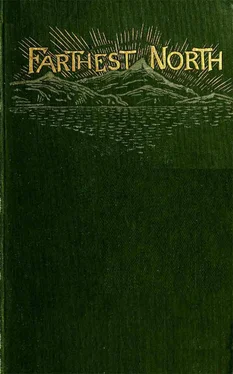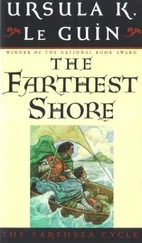Charles Lanman - Farthest North
Здесь есть возможность читать онлайн «Charles Lanman - Farthest North» — ознакомительный отрывок электронной книги совершенно бесплатно, а после прочтения отрывка купить полную версию. В некоторых случаях можно слушать аудио, скачать через торрент в формате fb2 и присутствует краткое содержание. Жанр: unrecognised, на немецком языке. Описание произведения, (предисловие) а так же отзывы посетителей доступны на портале библиотеки ЛибКат.
- Название:Farthest North
- Автор:
- Жанр:
- Год:неизвестен
- ISBN:нет данных
- Рейтинг книги:3 / 5. Голосов: 1
-
Избранное:Добавить в избранное
- Отзывы:
-
Ваша оценка:
- 60
- 1
- 2
- 3
- 4
- 5
Farthest North: краткое содержание, описание и аннотация
Предлагаем к чтению аннотацию, описание, краткое содержание или предисловие (зависит от того, что написал сам автор книги «Farthest North»). Если вы не нашли необходимую информацию о книге — напишите в комментариях, мы постараемся отыскать её.
Farthest North — читать онлайн ознакомительный отрывок
Ниже представлен текст книги, разбитый по страницам. Система сохранения места последней прочитанной страницы, позволяет с удобством читать онлайн бесплатно книгу «Farthest North», без необходимости каждый раз заново искать на чём Вы остановились. Поставьте закладку, и сможете в любой момент перейти на страницу, на которой закончили чтение.
Интервал:
Закладка:
After young Lockwood’s father and family had become settled in Washington, it was decided that he should return to Annapolis and take charge of the farm until some more suitable or congenial employment should come into view. In looking over the home letters which he wrote at that time, I find a few developments of character which are worthy of mention. For example, in February, 1872, he writes as follows:
“I find Annapolis the same as ever. It would hardly do for Rip Van Winkle to go to sleep here, for, when he awoke, he would find no change, not even by death.”
After speaking in the same letter of a man going to purchase implements in Baltimore, he says: “I think it would pay one capable of judging of such things, or one endowed with ‘Lockwood Common Sense,’” this allusion being to an imaginary manual which the children had attributed to their father. The quiet humor of the youthful farmer is manifested in another letter after this fashion: “I have been suffering all the week from the effects of a poison most probably communicated from some vine. It manifests itself pretty much as Job’s troubles showed themselves, and no position of body except standing affords relief. I haven’t yet got down into the ashes. If tartar emetic produced these eruptions, they might be attributed in some way to the evil agency of Mrs. W——.”
The person here alluded to was the one who became notorious for the alleged poisoning of General W. S. Ketcham, in Baltimore. Young Lockwood had met her at a boarding-house in Annapolis after her release from prison, and was agreeably impressed by her conversation and manners. On a subsequent occasion, when visiting his family in Washington, and some severe remark had been made against the lady in question, he demanded that the company present should not abuse an absent friend in his presence. Being of a sensitive nature in regard to the weather, as is proved by several of his Annapolis letters, and by such passages as the one now to be quoted, it seems surprising that he should ever have decided to visit the icy regions of the North.
“This gloomy weather,” he says, “is by no means calculated to elate one’s spirits, but, on the contrary, makes everything appear in its most dreary and desolate light, especially on a farm like this, and, though the spring will bring more work and attention, yet I shall hail its appearance with joy. I must confess that I can not prevent a feeling of loneliness from coming over me, particularly in the daytime, for at night my lamp and open wood-fire make things more cheerful, or rather less dreary.”
As these letters were written from a farm, and by a mere boy, they are chiefly devoted to asking for advice as to how he should manage affairs, and to reporting the condition of the crops; but, in their way, they prove that there was much solid manhood in the lad, and that he looked upon life as something substantial, and not as a kind of dreamland.
On one occasion, when visiting his home, he noticed that one of his sisters was manifesting what he thought an unreasonable excitement about the advent of cockroaches in the kitchen, whereupon he drew the figure of a vessel under full sail, beneath which he wrote the following: “The brig Anna Baby, bound to the north pole for a load of cockroaches.”
On another occasion, after consulting the family copy of Webster’s Dictionary, he wrote upon one of the fly-leaves, opposite the indorsements of Henry Clay, Daniel Webster, and other distinguished men, these words: “I regard this dictionary as very good, especially when you can not get any other.”
These incidents, though unimportant, help us to appreciate the character of the critical and independent youth.
The following example of the boy’s ingenuity is also worth mentioning:
In 1870 a brother-in-law gave him a small, cheap clock, about four and a half inches in diameter, which he at once adapted to the purpose of waking himself in the morning. After joining the slats of his bed together with battens, he sawed them through in the middle and hinged the parts. That half of the arrangement which was at the head of the bed was supported only by a single prop. A minute collar of lead was supported by one of the hands of the clock. At the proper time the lead slipped from the hand automatically, and, in falling, set in motion a system of levers which were connected with the prop by a string. Thus, with unfailing regularity, the prop was jerked from its place, and the young occupant of the bed was pitched headlong to the floor among his pillows and bolster. When he tired of this apparatus, it became his custom at night to hitch a string around his foot, the end of the string being passed out of the window and allowed to trail down to the kitchen-door. At a definite time in the morning, previously ordered, the colored cook pulled the string until she received intimation of a successful result.
In the hope of finding more congenial employment, young Lockwood now fixed his mind on engineer work in connection with railroads. He joined a corps on the Texas and Pacific Railroad line, and went to the northeastern corner of the State of Texas, where, for four months, he drove pegs and cut down bushes in the virgin wilderness, which employment was only terminated by the failure of the company to go on with its enterprise. What with the rough people with whom he was compelled to associate, the hard fare at the rude taverns, and a severe attack of sickness, he had a very disagreeable experience, which was enhanced by the non-payment of wages by the company, and by the temporary loss of the spare money furnished by his father, which was taken from him by the rascality of a pretended friend, an employé of the railroad company. By careful financial engineering, he managed to leave the wilderness of Texas, went to Shreveport, and thence to New Orleans, where he took a steamer for Cincinnati, and on this trip he met with one small bit of good fortune. Owing to his limited means he contracted with the captain of the steamer that he should be carried to Cincinnati, O., for a specific sum, all his meals to be included in the passage-money. It so happened, however, that the steamer was detained by floating ice for three weeks, but this caused no detriment to the traveler’s pocket, as time was not “nominated in the bond.” About eleven years after that experience, the same traveler was fighting his way through the ice of the Arctic seas and enduring the horrors of Cape Sabine, finding it difficult to secure necessary rations at any price or of any quality.
On reaching home, he began the study of bookkeeping with a view to the civil service. With others, he was examined for a position in the Treasury Department. He passed the examination with credit, and received a mark much above the number required for passing, but, when the office-mark was thrown in, as was then the custom, his average was reduced, and those who had personal influence and understood the “tricks of the trade” became the successful applicants.
CHAPTER II. – ARMY-LIFE IN ARIZONA.
After finding that farming and railroad engineering were not exactly the employments he had fancied them to be, young Lockwood resumed his studies under the direction of his father. Not long afterward, however, he was seized with the idea of entering the army, and, at the very outset of this venture for a useful life, he was met with a blending of good and bad fortune. Securing the influence of many friends, he made a successful appeal to the President and the War Department. He received orders for an examination before the proper tribunal, and, out of thirty-eight young men who were examined in Washington, he passed No. 1. He also had a higher mark than any of those examined in other places at the same time; hence he was entitled to the highest commission as second lieutenant, and at one time it was resolved to give it to him; but, as the examinations were conducted in different places and before different boards, it was decided to settle the rank of the applicants by lot, and Lockwood’s number was forty, instead of one to which he was justly entitled. He was, however, promised a crack regiment, and hence became second lieutenant in the Twenty-third Infantry, then commanded by two officers who had gained distinction in the late war—Colonel Jefferson C. Davis and Lieutenant-Colonel George Crook. He soon after joined the recruiting station at New York for instruction.
Читать дальшеИнтервал:
Закладка:
Похожие книги на «Farthest North»
Представляем Вашему вниманию похожие книги на «Farthest North» списком для выбора. Мы отобрали схожую по названию и смыслу литературу в надежде предоставить читателям больше вариантов отыскать новые, интересные, ещё непрочитанные произведения.
Обсуждение, отзывы о книге «Farthest North» и просто собственные мнения читателей. Оставьте ваши комментарии, напишите, что Вы думаете о произведении, его смысле или главных героях. Укажите что конкретно понравилось, а что нет, и почему Вы так считаете.












